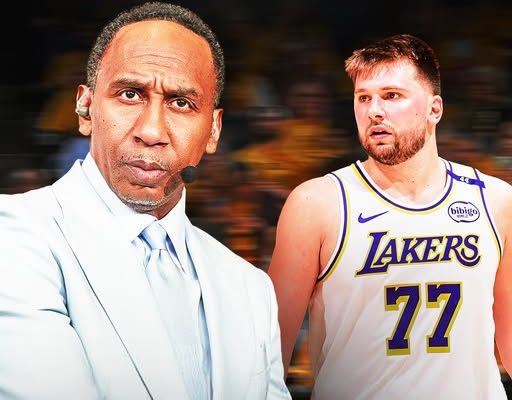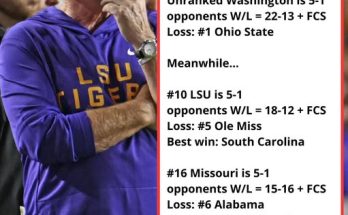After his injury scare, Stephen A. Smith weighs in on Lakers guard Luka Doncic’s EuroBasket return, and the conversation has once again sparked interest in the balance between international competition and NBA priorities. Luka Doncic has become one of the most electrifying talents in the world of basketball, and after joining the Los Angeles Lakers in what was perhaps the most shocking move of recent years, every development in his career is under a magnifying glass. Doncic suffered a scare in EuroBasket action when he took a hard fall that had fans, coaches, and executives holding their breath, wondering whether the Lakers’ new centerpiece could potentially be sidelined before the NBA season even begins. Fortunately, Doncic returned to play, and while the Lakers breathed a sigh of relief, Stephen A. Smith, one of the most outspoken voices in sports media, took the opportunity to give his take on the matter, mixing his brand of passionate opinion with concerns that many executives have been quietly holding.
Stephen A. has long been vocal about stars who risk their health in international tournaments, often arguing that while representing one’s country is admirable, the commitment to the NBA team that pays a player’s salary and builds a franchise around them should not be compromised. In the case of Doncic, Stephen A. pointed out the duality of the situation: the pride of playing for Slovenia and leading his nation in EuroBasket is deeply meaningful, but the Lakers, who invested heavily in acquiring him and reshaping their roster around him, cannot afford to lose him to an injury suffered outside of the NBA. The injury scare amplified that tension, reminding everyone of the fragility of careers and the stakes involved when elite players divide their energy between multiple basketball obligations. Stephen A. noted that while Doncic’s love for his country is undeniable, the Lakers fan base is understandably anxious. With LeBron James entering the twilight of his career and Anthony Davis battling his own history of injuries, Doncic is viewed as the next generational cornerstone who could keep the Lakers relevant for the next decade. For him to put that at risk in a summer tournament raises difficult questions about priorities.
At the same time, Stephen A. acknowledged the cultural and emotional significance of international basketball. Doncic grew up in Europe, and unlike many American players, international stars often view national team competition as equally, if not more, important than NBA play. For Slovenia, Doncic is not just another player; he is the face of their basketball program, the one who elevated them to global recognition. His commitment to EuroBasket is seen as a national duty, and he thrives in that role. Stephen A. stressed that while American audiences might dismiss such tournaments as secondary, in many parts of the world, they are sacred. The passion Doncic shows when he suits up for Slovenia is the same energy that has fueled his rise to superstardom in the NBA. To tell him to skip EuroBasket entirely would be to ask him to cut himself off from the very foundation of his basketball identity.
Yet, Stephen A. being Stephen A., he was not willing to let the injury scare slide without emphasizing the stakes for the Lakers. He argued that the organization now finds itself in a precarious situation. They cannot demand Doncic withdraw from international play, but they must be aware of the risks and perhaps work with his camp to manage his workload. Stephen A. drew parallels to other greats who juggled national team duties and NBA obligations, noting how injuries to players like Pau Gasol, Tony Parker, or even more recently Giannis Antetokounmpo during international competition affected their NBA teams. The Lakers, he warned, cannot allow Doncic to burn himself out before he even enters his prime years in Los Angeles.
The debate Stephen A. reignited also speaks to a broader question about modern sports. Should NBA teams have more say in whether their players participate internationally, especially when so much money and organizational planning is invested in those athletes? Stephen A. leaned toward the pragmatic side, suggesting that while patriotism and national pride are noble, the business realities of the NBA cannot be ignored. He said plainly that if Doncic were to suffer a significant injury in EuroBasket, it would not just derail Slovenia’s hopes—it would derail the Lakers’ entire franchise trajectory for years. That is the kind of responsibility that transcends the romance of playing for one’s country.
Still, Stephen A. did not fault Doncic personally for playing. He was careful to highlight Luka’s competitive spirit and his loyalty, qualities that fans admire about him. Instead, he challenged the Lakers’ front office and the NBA as a whole to rethink how these situations are handled. Could there be insurance policies, stricter workload management, or agreements between FIBA and the NBA to better protect players? The injury scare, Stephen A. argued, was a warning shot. Next time, it could be more serious. The conversation has already reached fans on social media, who are divided between respecting Doncic’s decision and fearing the consequences for the Lakers. Some argue that the Lakers should embrace his international role, believing that his EuroBasket battles only sharpen his skills and make him more dominant when he returns to the NBA. Others echo Stephen A.’s concern, worried that the Lakers are one awkward landing away from seeing their future crumble.
In evaluating Stephen A.’s comments, it becomes clear that this debate is not going away. Doncic’s career is still in its early prime, and Slovenia will continue to call on him to lead them in major tournaments. Unless the NBA enforces strict limitations—which would likely spark backlash from international federations—star players like Doncic will continue to walk this tightrope between two worlds. Stephen A. simply used his platform to bring that reality into sharper focus, and whether one agrees with him or not, the timing of Doncic’s injury scare made his words hit harder.



